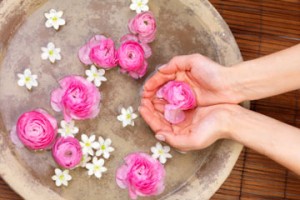Rose is a woody plant of the rosaceae family having spikes. There are above one hundred species of roses, with large eye-catching flowers in a variety of colors. Although roses are considered native to Asia but they are also cultivated in Northern Africa, and North America and Europe. Roses hybridize easily and as a consequence numerous garden roses have been developed.

Roses are best recognized as decorative plants grown for their flowers in the garden and occasionally indoors. They have been also used for commercial cut flower crops and commercial perfumery. Some are utilized as landscape plants, for hedging and for additional effective purposes such as slope stabilization and game cover. There are a lot of health benefits and medicinal practices of a rose. There are about three hundred chemical components of which nearly hundred have been recognized. Medicinal parts of rose plant include petals, flowers, essential oil, root bark and root.
Rose petals are utilized in manufacturing rose oil that is steam distilled by grinding. Rose water is the byproduct of steam distillation, which is a tremendous relaxing agent, enhances flavor of many dishes across the world and soothes the nerves. Rose essence is enriched with vitamins A, B3, C, D and E as well as includes tannins, flavonoids and antioxidants, making it advantageous for skin care. Rose water is an efficient astringent that diminishes swelling of capillaries under the skin. Rose water advantages include improving hair growth and nourishing the scalp. It is pharmaceutically used as an anti-inflammatory, antiseptic and antibacterial product. It is also utilized to treat eczema, dry scaly skin and dermatitis. Being antiseptic in nature, rose petals are a vital ingredient in eye washes as well.

Rose petal tea is effective in cleansing the liver and gall bladder and promotes bile secretion. Rose tea is prepared by drying and crushing petals. Rose tea also helps in remediating bronchial infections and mild sore throats. The tea decreases fever-related rashes and gives cooling effect. In combination with carrier oils such as grape fruit or almond, rose essential oil is used to treat various disorders like nausea, hemorrhage, ulcers, asthma, fatigue, dehydration, liver problems and bacterial infections of the colon, urinary tract and stomach. The seeds extracted from the Japanese rose are used in oriental medicine as a laxative and diuretic. Drinks of dried rose petals are taken after meals to assist digestion and also used against headaches. Steam inhalation of a decoction of rose petals, cloves and mint help induce sleep. Flower decoctions are pooled with Chinese herbs for liver dysfunctions.

Tinctures from the petals are used for sluggish digestion or diarrhea. Gargles manufactured from petal infusions are used alone or in combination with sage against sore throats. Creams from the essential oil are used to treat inflamed or dry skin. Rose water mixed with equal quantity of witch hazel is applied as a moisturizing lotion for skin prone to acne or pimples. A few drops of essential oil can be added to bathwater for depression, grief, or insomnia. Massage oil is made by mixing neutral oil with a few drops of essential oil and applied to relieve exhaustion and stress. The Chinese use rose flowers as blood tonic and energy stimulant to relieve stagnant liver energies. The petals of Damask rose are collected and steam distilled to manufacture true Bulgarian rose oil used in most of the women’s perfumes.




